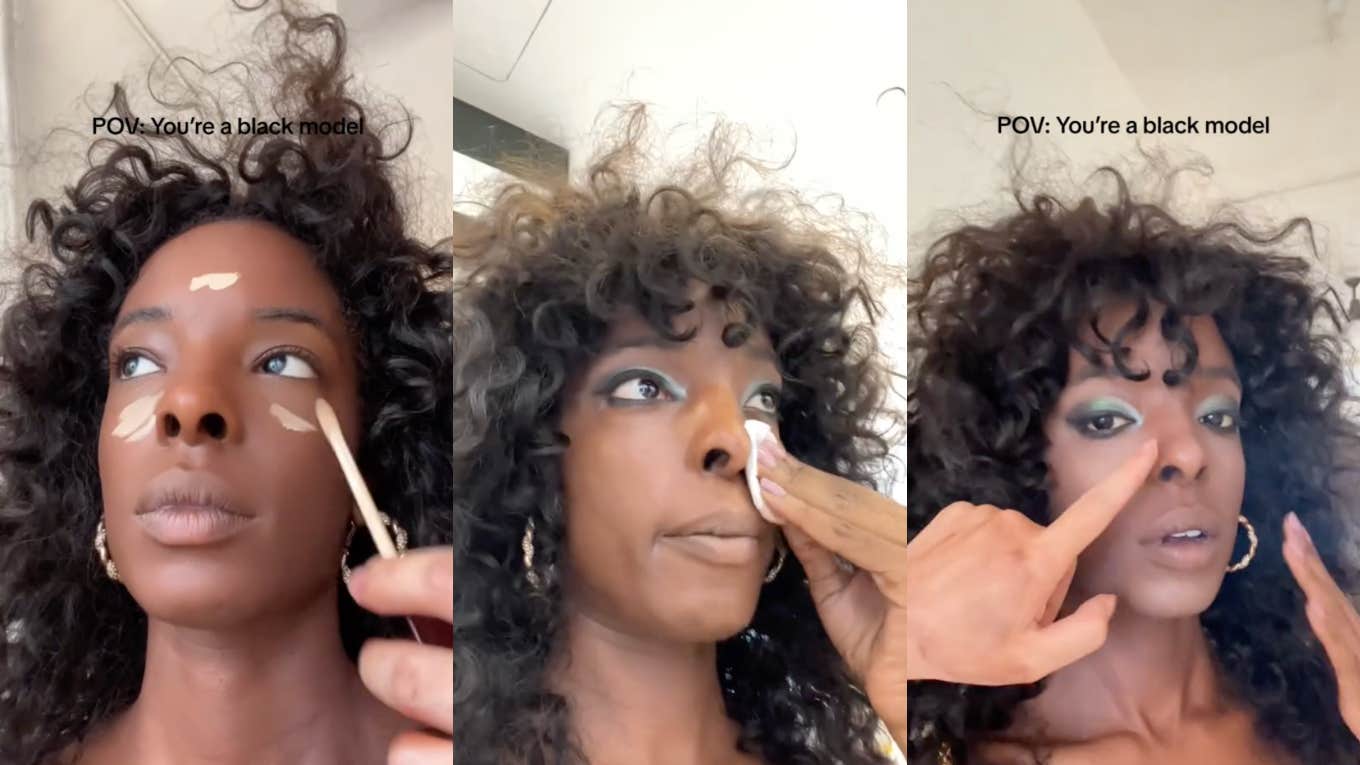Black Model Forced To Buy New Makeup And Do Her Own Face After An Artist Uses White Foundation On Her
Her emotional reaction to having to redo her makeup proves that we need more diversity in the beauty and styling industry.
 @megan.milan / TikTok
@megan.milan / TikTok A Black model sparked a discussion around the importance of diversity after she showed what it's like behind the scenes of fashion week with white makeup artists having to do her face. In a TikTok video, Megan Milian explained how she got stuck having to fix her own face makeup after a lack of consideration from a makeup artist who clearly didn't know how to work on a Black woman's face.
She had to buy new makeup for her show after an artist used a white foundation on her face.
In Milian's video, she had been getting ready to walk a show during New York Fashion Week, but beforehand, she was meant to get her makeup done. As she is recording the process, the white makeup artist working on her is seen putting white foundation on different parts of her face, which clearly don't match her skin tone at all.
After the finished product, Milian pointed out to the other makeup artists who were critiquing the final look that she looked "like a ghost."
In the caption of her video, she explained that when it comes to people doing her makeup for different photoshoots or other fashion events, she will usually pack her own foundation. In this case, however, "I didn't want to carry a makeup bag all day, this was my first job of the day. I had to go to Sephora, do my own makeup then come back," she wrote, clearly begrudged by the lack of preparedness from the makeup artist who didn't know how to do a face on a dark-skin woman.
In a follow-up video, Milian recorded herself having to leave the shoot and make the quick trip to Sephora, where she spent her own money on new makeup that she could use to fix the previous disaster.
"On my way to Sephora right in the middle of a shoot. I'm so irritated, I'm so tired. It's just frustrating that we have to deal with this all of the time," Milian said as she stood in Sephora, taking off her makeup and holding back tears. "If you didn't know how to do Black girl's makeup, why would you even [try]?"
Luckily, Milian was able to find another makeup artist named Donni Davy, who was also white, to help finish her makeup for the fashion week show. In the photos of the completed look, Milian looks both relieved and elated to have finally found someone who is able to do her makeup and do it correctly.
Milian's exasperation proves that there is a lack of diversity and inclusion when it comes to makeup artists and hair stylists.
Time and time again, in both the fashion industry and Hollywood, we see a severe lack of Black hairstylists and makeup artists, which often leaves Black creatives with the task of doing it themselves.
In 2019, #ActingWhileBlack was trending on Twitter, where many Black actresses shared the horror stories they've experienced on the sets of different TV shows, movies, and even photoshoots. Actress Yvette Brown wrote in a viral tweet that many "Black actresses come to set with their hair done or bring their wigs and clip-ins with them. It’s either that or take a chance that you will look crazy on screen.”
In July 2020, Simone Biles graced the cover of American Vogue, but when her cover was shown to the public, many people were angered by the unflattering and badly-lit image. To make matters worse, the cover was shot by a white woman, famed photographer Annie Leibovitz, who didn't even take the time to make sure the lighting for Biles' cover photo flattered her skin tone.
If people are going to hire Black creatives to be in their films, and TV shows, be on the covers of their magazines, or walk in their fashion shows, then it's important to diversify the people doing their makeup, their hair, and taking their photos. It shouldn't be their job to bring their own makeup to the set for fear that the artist won't know how to do it for them with their own tools.
Hiring both Black makeup artists and hairstylists ensures that these professionals have an intimate understanding of the specific needs and nuances of Black hair and skin. In the same vein, it's also important that white makeup artists and hairstylists have that same understanding because you can't be in that profession if you don't know how to take care of everyone, not just the people who may look like them.
Milian's experience highlights the ongoing need for a more inclusive and diverse beauty and styling industry. Every individual, regardless of their background, should feel seen, respected, and empowered.
Nia Tipton is a Chicago-based entertainment, news, and lifestyle writer whose work delves into modern-day issues and experiences.
